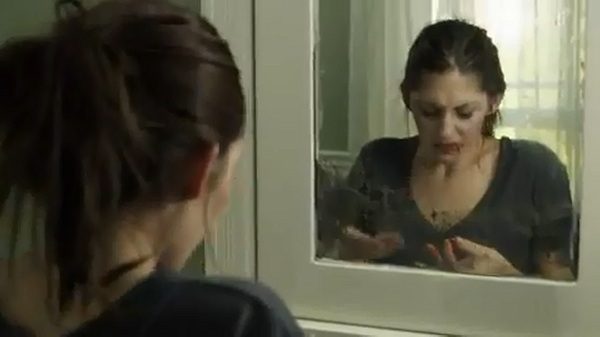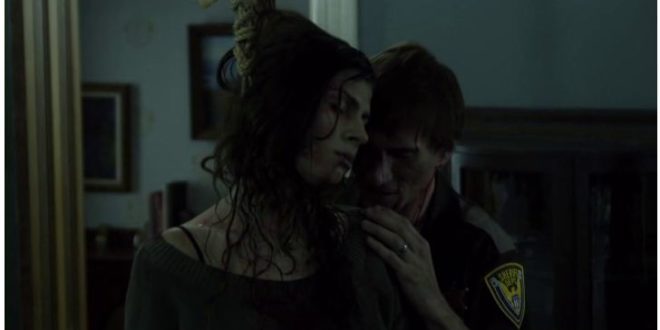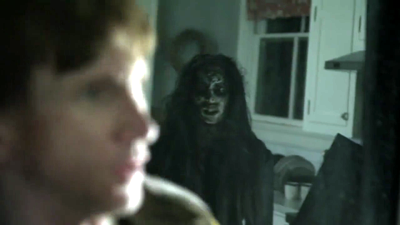Potential stumbling block #2: Storywise, this movie starts with a series of supernatural murders, rather than mere hauntings. These are not your grandparent’s ghosts, that’s for sure. They get things done. However, some may have a problem with this sort of intro, and I wasn’t so crazy about it myself. The movie seems impatient as a result, and it could be regarded as catering to short attention spans. In fact, the beginning of this movie almost seems like a horror movie finale. No time is spent on buildup, which may be a letdown. With such an action packed beginning, it’s hard to ramp up excitement as successfully later on. That’s why most classic horror movies start relatively slow — possibly even boring. It’s like a Diva singing onstage. You generally don’t start on a high note, as it’s tough to top that note later on. Also, with this beginning, there’s an immediate impression that horror equals murder.. You gotta’ deliver the kills right away, right? Well, plenty of horror movies have high body counts and instant bloodshed gratification, but it doesn’t make them all good (at least not in my book). Had I directed this movie’s beginning, I might have merely indicated that murders took place, and not actually shown them. A viewer might then wonder what happened to those people, and what will happen next.

Moving on: Haunting in Salem redeems itself in some ways, and I like it more than some other reviewers. It has good horror makeup effects — particularly on the daughter character, Alli Downs (Jenna Stone) toward the end. There are horror homages throughout that somehow seem natural to the story. That’s not as easy as it sounds. For example, during one scene a camera pans away from an ordinary box, then back again to show us that it moved on its own. One might cry, “I already saw that in Poltergeist!” But it could also just be standard ghost fare. Ghosts move things around sometimes. It’s part of what they do! Then there’s a former alcoholic dad who seems to be going nuts, like in The Shining (though this dad’s name is Wayne Downs, and he is played by Bill Oberst Jr.). However, he never becomes as threatening as Jack Nicholson’s character and therefore isn’t overly derivative.
Some horror fans might identify these homages fondly if they’re open to them. In any case, they stockpile rather quickly. Sheriff Wayne’s wife, Carrie (Courtney Abbiati), finds a tooth in the shower drain, not unlike a tooth-finding scene in the Texas Chainsaw Massacre. There are obligatory banging noises, standard to classic haunted house stories. There is a superfluous, “slow” groundskeeper character named McSwain (Sonny King), reminiscent of a mentally challenged gardener from 1958’s, The Screaming Skull. An attack scene with a baseball bat recalls Hannibal Lecter’s baton attack in Silence of The Lambs. And, as another Jack Torrence homage, daddy Downs mentions to his wife how his family will fall apart if he loses his job as town Sheriff. It’s similar to Jack’s angry speech at Wendy about his position at the Overlook Hotel. See, the relationship here between Carrie and Wayne is strained, especially after a ghost makes him accidentally strike his son. In fact, even a haunted laptop gives an homage to The Shining. This homage list could go on, yet that somehow doesn’t bother me. It flows organically enough.
There are semi-original things here, I should say. The aforementioned household laptops are haunted by a ghost called “19”, who likes harassing the ladies of the house via instant messaging. To help us understand “19”, we’re informed that 19 people were executed for witchcraft in Salem, so this ghost was/is probably the 19th victim. Not only is this macabre, but it’s a possible critique of superstitious thought, which is surprisingly uncommon in horror. However, that critique is obviously minimal when this is still a haunted house story. What else is unique? It’s interesting to have a Sheriff character who hardly does any police work. The movie centers overwhelmingly on his relationship with his family. Sure, it mentions a thing or two about past regrets in the line of duty, but it doesn’t dwell on them. Those are just another footnote here, like the Salem witches themselves.
Because so little of Salem’s actual history is explained, it makes the viewer’s questions more pronounced. However, hat’s not necessarily a bad thing. My questions: Why are ghosts always targeting innocent people? Why don’t they just tell us what they want, rather than have us dig up graves, look under floorboards and go nuts looking for clues? In the end, some dead people are just hanging around (in some cases literally from nooses) and we don’t even know why. Come on ghosts: Help us help you. Are we supposed to burn the ghost witches yet again, this time with accelerant? Do we need to break an evil spell by reciting magic passages? How about we just apologize for what our ancestors did, though we never met them? Do witch ghosts want money? What is it? Throw us a frickin’ bone here!
Overall, sometimes this is is what you get with a haunted house/witch-ghost story: a lot of unanswered questions. The big question isn’t, “Are you a good witch or a bad witch?” It’s, “Are you a victimized Salem witch or an Evil Dead homage witch?”
 PopHorror Let's Get Scared
PopHorror Let's Get Scared





